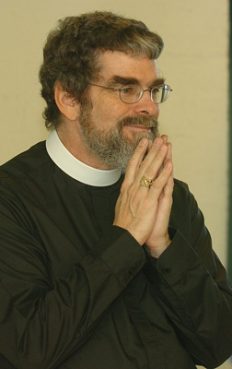
(RNS17-NOV23) Vatican astronomer Guy Consolmagno, a Jesuit brother, gives a guest lecture at Le Moyne College in Syracuse, N.Y. Religion News Service file photo by Jim Commentucci/The Post-Standard.
SYRACUSE, N.Y. (RNS) Brother Guy Consolmagno, author and editor of “The Heavens Proclaim: Astronomy and the Vatican,” is teaching this fall here at Le Moyne College.
An astronomer at the Vatican Observatory, Consolmagno serves as curator for the Vatican meteorite collection in Rome. He spoke about why science needs religion, bad apples, and Galileo. This interview has been edited for length and clarity.
Q: What are those stars up in the sky, fiery balls of matter or the tapestry of God?
A: The answer, of course, is — yes!
One thing I’m trying to do at Le Moyne is getting students to look at the sky with more than one set of eyes. By accident, I was preparing a talk, and I had a photograph of the Pleiades and the “Starry Night” image from Van Gogh, and I realized the stars are almost in the same position. When you superimpose the two, you realize there is more than one way of looking at the stars.
Q: Think there’s life out there?
A: You know, I do, but that’s just a hunch. I’ve got no data, no more than anybody else does. I think the science fiction fan in me kind of hopes there is.
Q: You said, religion needs science to keep it away from superstition and keep it close to reality.
A: I must confess that it wasn’t me who said that, I was quoting Pope John Paul. So it comes from a better authority than me. And it does work. There is a lot of superstition in the world, and there is a lot of need to pull back and say, `Wait a minute, how much of this is just because it makes me feel good, and how much of this is based on reality,’ because it’s not obvious, necessarily, that it’s one or the other.
Q: Does science need religion as much as religion needs science?
A: Oh, absolutely. Science needs religion to justify its very existence. There are certain assumptions you have to make about the universe before you can do science. You have to assume that the universe actually exists, and we’re not just imagining it out of our heads. And that’s a philosophical assumption. There are philosophies that don’t believe that. You have to believe that the universe makes sense before you can even start looking for the rules of the universe. You have to assume the universe has rules.
Q: Are there areas where you find the ways of science conflict with the doctrines of the church?
A: People don’t really understand what science is, and they don’t really understand what the doctrines of the church are. The way they’re put together, they can’t possibly conflict, because they’re not really talking about the same things. In one sense, we’re talking about the natural world, of which we’ve got theories that we understand very well, but that only approximate the reality of what the physical universe has for us. And in religion, we’ve got truths that we know are true, but we don’t understand them. So in that sense, it really is apples and oranges.
Q: Apples are a bad image, if we’re talking about Genesis.
A: The word “apple” actually never appears in Genesis, I’ll have you know.
Q: Really? I stand corrected.
A: More to that — and thanks to Galileo, it’s especially easy, being a Catholic, because the church so screwed up in the Galileo case, that it’s been careful to never make that mistake again.
Q: I wasn’t going to mention Galileo, but since you raised it. . .
A: It’s something that, as an astronomer, in the year of Galileo, it’s important to raise. Galileo was a good Italian, a good Catholic, after that absurd trial, and he’s a hero.
Q: But he wasn’t viewed a hero back then, was he?
A: Actually, he was. The church really supported him for most of his life. Then for a few years he was in trouble, and then he was supported again. It’s sort of bizarre. Nobody totally understands what was going on back then. His first house arrest was spent at the house of the Archbishop of Sienna, as a personal honored guest. It’s bizarre.
Q: What should we put our faith in, astronomy or God?
A: Well, as the old president said, “Trust, but verify.” There’s a famous line of St. Ignatius that sometimes gets flipped. It’s, “Pray as if everything depends on God, and work as if everything depends on you.” Sometimes it’s said, “Pray as if everything depends on you, and work as if everything depends on God.” Look, we are creatures put on this earth by God not to sit around, do nothing and expect him to do everything. What’s more, that’s no fun. This is a participatory game, not a spectator sport.
(Hart Seely writes for The Post-Standard in Syracuse, N.Y.)




